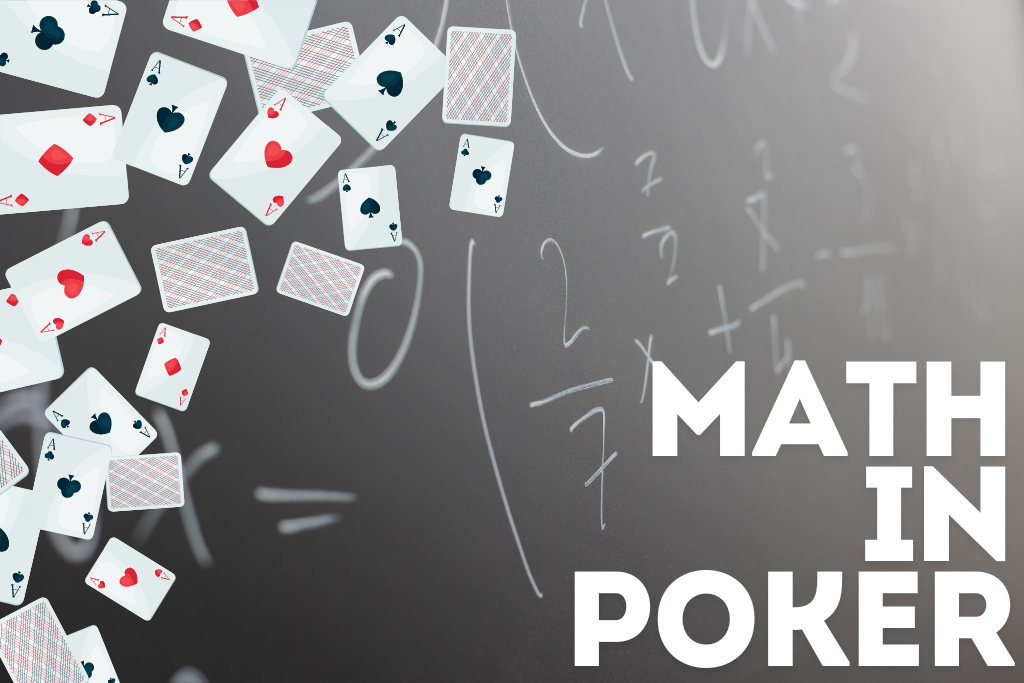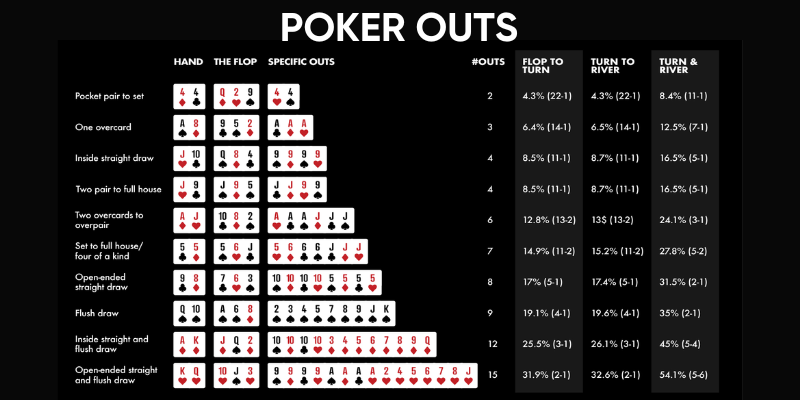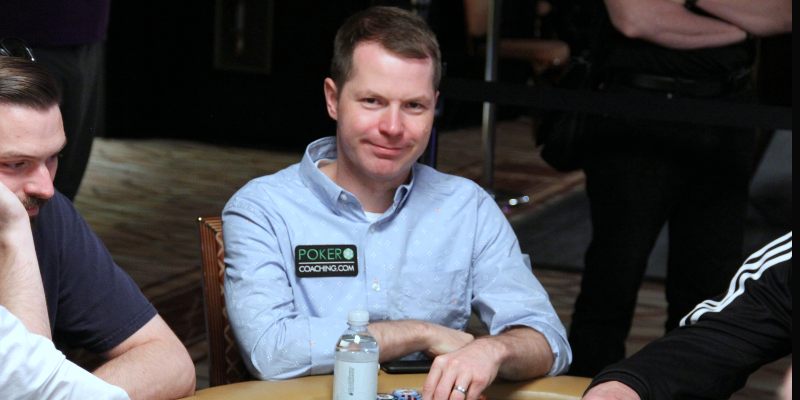
In this article, we will answer the main question – is it necessary to understand complex formulas and do you need to know mathematics to play poker well?
Best online poker rooms:
The luck factor is not enough to outweigh the need for mathematics
The fiercest critics of mathematics in poker say that it is not needed when a player is lucky. However, luck is often not just a series of blind coincidences. Luck is much more often the result of making the right decisions at the right time.
The best succeed, not just anyone. It's hard to say exactly what part of the game is luck and what part is mathematics, but an optimal calculation would be to say that theory and fundamentals account for at least 90% of wins, while luck and fortune account for up to 10%.
One hand, one game, or maybe one tournament could be won by intuition rather than usual calculations, but in the long run, such play is extremely unprofitable, and no professional or experienced player would rely on such a strategy all the time.
But this is not some super significant news. We are more interested in clarifying the facts about whether you need knowledge of mathematics to win at poker?
The real benefit of game theory in practice
The best experts in game theory and mathematics worldwide are scientists and mathematicians from prestigious universities in the USA and around the world (MIT, Harvard, Cambridge, Oxford, etc.). However, apart from the internationally recognized mathematician Alan Bustany (working at Cambridge University, UK), it is hard to find any well-known poker players who are also mathematicians.
This means that it is not enough to just be good at mathematics to be a successful poker player. Otherwise, every mathematician from a prestigious university would rake in millions in prizes every year.
Mathematicians themselves say that in poker, it is not enough to just know dry theory. Professional poker players agree with them. Mathematics will not guarantee 100% wins because in poker, it is important to understand player psychology, analyze bluffs, mask emotions, and not give away anything to other players at the table, whether you are playing virtually or in reality.
Probably the most famous figure in game theory in poker is J.F. Nash. He was a 20th-century scientist whose formula – Nash equilibrium – linked probability theory and other mathematical functions with poker.
Essential probabilities
The essential principles, and the mathematical constants, theories, and formulas derived from them, involve the probability of certain scenarios. Knowing basic probabilities is worthwhile. For example, you have:
- 17.4% probability of having no pair or high card;
- 43.8% probability of having one pair;
- 23.5% probability of having two pairs;
- 4.83% probability of having three of a kind;
- 4.62% probability of having a straight;
- 3.03% probability of having a flush;
- 2.6% probability of having a Full House;
- 0.168% probability of having four of a kind;
- 0.0279% probability of having a straight flush;
- 0.0032% probability of having a royal flush.
Pot odds
Knowing these probabilities can help you better plan your game. However, even more important than these probabilities are pot odds, without which no player dares to move forward. Pot odds are a fairly simple probability calculation, which is the ratio between your bet (call) and the total pot size. For example, if your bet is €10 and the pot is €40, then pot odds are 4:1 or 25%.
Outs
And you also need to know everything about “outs” or those cards that, when revealed until the river, would make your hand a winning one. Suppose a player has a 10 and K of spades in hand. Almost all the cards are revealed on the table (missing the last one), and now our player has four spades and wants to get a flush. Also, suppose there is an overcard in hand, which means that if the flush does not come out, you have a backup option – a high pair (K pair), which would also help improve the chances.

Seeing such a combination in your hand, you can be sure that if the right card falls, it is almost impossible for someone to have a better combination (don't forget the probabilities of combinations). We calculate the probability and see that there are currently 4 identical suit cards on the table (4 spades). This means that there are still 9 spades left in the deck. We have 9 outs. There are still 3 kings left in the deck, so we have another 3 outs. In total, we have 12 outs, and based on this number, we can calculate the probabilities that your card will fall. Calculations are made using the rule of four and the rule of two.
The rule of four applies after the flop, and the rule of two after the turn.
- After the flop – Outs * 4
- After the turn – Outs * 2
So, we see that the probability that the necessary outs or, in other words, the necessary cards will fall after the flop is 48%, and after the turn – 24%. True, the calculation is simplified and the actual probabilities are slightly adjusted for error, but to give you a better understanding, here is a table with the exact percentage values of how likely it is, based on the outs calculation, that the necessary card will fall for you.
| After the Flop (two cards left) | After the Turn (one card left) | ||||
| Number of Outs | Probability by rule of four | Exact Probability | Number of Outs | Probability by rule of two | Exact Probability |
| 1 | 4 % | 4.5 % | 1 | 2 % | 2.3 % |
| 2 | 8 % | 8.8 % | 2 | 4 % | 4.5 % |
| 3 | 12 % | 13.0 % | 3 | 6 % | 6.8 % |
| 4 | 16 % | 17.2 % | 4 | 8 % | 9.1 % |
| 5 | 20 % | 21.2 % | 5 | 10 % | 11.4 % |
| 6 | 24 % | 25.2 % | 6 | 12 % | 13.6 % |
| 7 | 28 % | 29.0 % | 7 | 14 % | 15.9 % |
| 8 | 32 % | 32.7 % | 8 | 16 % | 18.2 % |
| 9 | 36 % | 36.4 % | 9 | 18 % | 20.5 % |
| 10 | 40 % | 39.9 % | 10 | 20 % | 22.7 % |
| 11 | 44 % | 43.3 % | 11 | 22 % | 25.0 % |
| 12 | 48 % | 46.7 % | 12 | 24 % | 27.3 % |
| 13 | 52 % | 49.9 % | 13 | 26 % | 29.5 % |
| 14 | 56 % | 53.0 % | 14 | 28 % | 31.8 % |
| 15 | 60 % | 56.1 % | 15 | 30 % | 34.1 % |
| 16 | 64 % | 59.0 % | 16 | 32 % | 36.4 % |
| 17 | 68 % | 61.8 % | 17 | 34 % | 38.6 % |
How do professionals do it?
Again, there are many professionals, and their views and opinions can differ. Representatives of the old school often tend to think that poker can be felt and the course of the game can be predicted without relying on mathematics. Meanwhile, representatives of the new school pay less attention to instincts and pragmatically evaluate situations. If the numbers say so, it means that another decision is ineffective.
Let's take the example of a good player. Jonathan Little – a two-time WPT champion and author of various poker books. In one of his interviews with 888Poker representatives, this poker player shared his perspective on whether it's necessary to understand mathematics in the game, how important it is, and how he uses it to gain an advantage.

As J. Little says – the essence of everything is precisely the calculation of pot odds and outs. He always thinks about how realistic and likely it is that he will win this round, based on the probability of outs calculation before making any decision. According to him, there's no way around this. The poker veteran cannot imagine how one could attempt to achieve serious results in the poker arena without such basics. According to the American, such knowledge defines professionalism and determines results.
However, during the interview, the player also revealed that it is very easy to stray into complete uncertainty if you devote yourself solely to mathematical solutions in poker. Initially, it is enough to simply memorize the outs probability table (it is in this article) and the pot odds calculation formula. If you don't do this, there can be catastrophically unsuccessful stages in your game. It is once again mentioned that you can't escape these things.
How to Improve Poker Math Skills?
According to experienced poker players, instead of learning just theory and calculations “on paper,” it is better to practice by playing without real money or by arranging a deck in front of you. You will create a visual and intuition-based memory that will help develop the game instincts needed for success. It can be assured that with enough experience, you will be able to make the best decisions about 4 times out of 5 without even thinking.
Some learn by reading, others need to see everything visually. However, practice teaches best, so by playing, initially without rushing, and calculating, you will best memorize the probabilities and actions needed to win.
The History of Math in Poker
In the mid-19th century, modern 52-card decks began to be used, so all the mathematics and game theory associated with poker only emerged around the second half of the nineteenth century. Theory and the emergence of the game went hand in hand, and the first real theory book is dated 1875, so it can be said that players quickly noticed the benefits of certain calculations and theories for the course of the game.
Later, as theories developed and especially after the advent of computers and more literature, information became accessible to anyone interested, and in the 21st century, every poker player can not only acquire various literature but also purchase programs that perform those calculations for them in real-time.
Summary
Answering the main question – is it necessary to understand complex formulas and do you need to understand mathematics to play poker well? No, you don't need to have very deep mathematical knowledge, but you definitely need an understanding of pot odds and outs calculation, otherwise you risk being exploited by stronger players and not being successful in the long term.
Master the basic formulas and remember the probability expressions in percentages, and you will already have a solid foundation for serious poker play. If you want to improve and play better tomorrow, absorb all the information written here, and you will see that improvement will be noticeably evident.
FAQ
No, not necessarily. However, having mathematical knowledge will help with probability calculations, evaluating pot odds, and making decisions.
Pot odds are the ratio between the size of the pot and the amount needed to call. They help players decide whether it is worth calling a bet based on the probability of winning the hand.
Math helps determine when it is worth bluffing by evaluating the probability that opponents will fold compared to the size of the bet and the size of the pot.





